#Narrative experimentation
Text
"Navigating the Labyrinth: James Joyce's Ulysses and the Odyssey of the Human Mind"

James Joyce's "Ulysses" stands as a formidable literary labyrinth, a narrative tour de force that immerses readers in the intricate complexities of the human experience. Published in 1922, this modernist masterpiece has carved a unique niche in the literary landscape, challenging and captivating readers with its avant-garde style and profound exploration of the ordinary. In "Ulysses," Joyce transforms a single day in the life of three characters—Stephen Dedalus, Leopold Bloom, and Molly Bloom—into an epic journey through the streets of Dublin, mirroring the structure of Homer's "Odyssey."
The novel unfolds with a linguistic prowess that is both daunting and exhilarating. Joyce's stream-of-consciousness technique weaves a tapestry of thoughts, memories, and sensory impressions, capturing the ever-shifting landscapes of the characters' minds. The use of multiple narrative styles, rich symbolism, and a kaleidoscope of allusions creates a literary symphony that challenges traditional notions of storytelling. "Ulysses" is not merely a novel; it is an immersive experience that demands active engagement from the reader.
Joyce's audacious experimentations with language are mirrored in his deep exploration of the mundane aspects of daily life. The seemingly trivial events of June 16, 1904, become a canvas on which Joyce paints a vivid portrait of humanity, exploring themes of love, identity, sexuality, religion, and the passage of time. Each episode is a microcosm reflecting the broader human condition, and Joyce's unflinching gaze transforms the ordinary into the extraordinary.
While "Ulysses" has earned its reputation as a challenging read, its difficulty is intrinsic to its brilliance. The novel's complexity mirrors the complexity of life itself, and its deliberate departure from traditional narrative structures invites readers to actively participate in the creation of meaning. As one navigates the labyrinth of Joyce's prose, the reward is not just in deciphering the text but in the profound insights gained about the nature of existence.
The legacy of "Ulysses" extends beyond its literary merits. It has become a touchstone for scholars, inspiring countless interpretations, analyses, and even an annual celebration known as Bloomsday. Joyce's work has influenced subsequent generations of writers, challenging them to push the boundaries of storytelling and language. The novel's impact is a testament to its enduring relevance, transcending time and cultural shifts.
In conclusion, "Ulysses" is a literary odyssey that invites readers to embark on a journey of self-discovery and intellectual exploration. Joyce's intricate narrative, linguistic virtuosity, and profound thematic scope make it a work that continues to resonate with those willing to navigate its intricate passages. While challenging, "Ulysses" stands as a testament to the limitless possibilities of literature, proving that within the labyrinth of complexity lies a rich tapestry of human experience waiting to be unraveled and understood.
James Joyce's "Ulysses" is available in Amazon in paperback 17.99$ and hardcover 25.99$ editions.
Number of pages: 482
Language: English
Rating: 9/10
Link of the book!
Review By: King's Cat
#James Joyce#Ulysses#Modernist literature#Stream of consciousness#Avant-garde#“Odyssey” adaptation#Dublin#June 16#1904#Stephen Dedalus#Leopold Bloom#Molly Bloom#Linguistic prowess#Symbolism#Allusion#Narrative experimentation#Literary symphony#Human experience#Mundane aspects#Daily life#Love#Identity#Sexuality#Religion#Passage of time#Microcosm#Complexity#Trivial events#Profound insights#Active engagement
5 notes
·
View notes
Text
"Navigating the Labyrinth: James Joyce's Ulysses and the Odyssey of the Human Mind"

James Joyce's "Ulysses" stands as a formidable literary labyrinth, a narrative tour de force that immerses readers in the intricate complexities of the human experience. Published in 1922, this modernist masterpiece has carved a unique niche in the literary landscape, challenging and captivating readers with its avant-garde style and profound exploration of the ordinary. In "Ulysses," Joyce transforms a single day in the life of three characters—Stephen Dedalus, Leopold Bloom, and Molly Bloom—into an epic journey through the streets of Dublin, mirroring the structure of Homer's "Odyssey."
The novel unfolds with a linguistic prowess that is both daunting and exhilarating. Joyce's stream-of-consciousness technique weaves a tapestry of thoughts, memories, and sensory impressions, capturing the ever-shifting landscapes of the characters' minds. The use of multiple narrative styles, rich symbolism, and a kaleidoscope of allusions creates a literary symphony that challenges traditional notions of storytelling. "Ulysses" is not merely a novel; it is an immersive experience that demands active engagement from the reader.
Joyce's audacious experimentations with language are mirrored in his deep exploration of the mundane aspects of daily life. The seemingly trivial events of June 16, 1904, become a canvas on which Joyce paints a vivid portrait of humanity, exploring themes of love, identity, sexuality, religion, and the passage of time. Each episode is a microcosm reflecting the broader human condition, and Joyce's unflinching gaze transforms the ordinary into the extraordinary.
While "Ulysses" has earned its reputation as a challenging read, its difficulty is intrinsic to its brilliance. The novel's complexity mirrors the complexity of life itself, and its deliberate departure from traditional narrative structures invites readers to actively participate in the creation of meaning. As one navigates the labyrinth of Joyce's prose, the reward is not just in deciphering the text but in the profound insights gained about the nature of existence.
The legacy of "Ulysses" extends beyond its literary merits. It has become a touchstone for scholars, inspiring countless interpretations, analyses, and even an annual celebration known as Bloomsday. Joyce's work has influenced subsequent generations of writers, challenging them to push the boundaries of storytelling and language. The novel's impact is a testament to its enduring relevance, transcending time and cultural shifts.
In conclusion, "Ulysses" is a literary odyssey that invites readers to embark on a journey of self-discovery and intellectual exploration. Joyce's intricate narrative, linguistic virtuosity, and profound thematic scope make it a work that continues to resonate with those willing to navigate its intricate passages. While challenging, "Ulysses" stands as a testament to the limitless possibilities of literature, proving that within the labyrinth of complexity lies a rich tapestry of human experience waiting to be unraveled and understood.
James Joyce's "Ulysses" is available in Amazon in paperback 17.99$ and hardcover 25.99$ editions.
Number of pages: 482
Language: English
Rating: 9/10
Link of the book!
Review By: King's Cat
#James Joyce#Ulysses#Modernist literature#Stream of consciousness#Avant-garde#“Odyssey” adaptation#Dublin#June 16#1904#Stephen Dedalus#Leopold Bloom#Molly Bloom#Linguistic prowess#Symbolism#Allusion#Narrative experimentation#Literary symphony#Human experience#Mundane aspects#Daily life#Love#Identity#Sexuality#Religion#Passage of time#Microcosm#Complexity#Trivial events#Profound insights#Active engagement
0 notes
Text
By: Mary Harrington
Published: Feb 19, 2024
A new study challenges the common assertion that gender-dysphoric youth are at elevated risk of suicide if not treated with “gender affirming” medical interventions. If it’s true, it ought to have a seismic impact on the accepted medical approach to gender-confused youth.
Reported in the BMJ, the study examines data on a Finnish cohort of gender-referred adolescents between 1996 and 2019, and compares their rates of all-cause and suicide mortality against a control group. While suicide rates in the gender-referred group studied were higher than in the control group, the difference was not large: 0.3% versus 0.1%. And — importantly — this difference disappeared when the two groups were controlled for mental health issues severe enough to require specialist psychiatric help.
In other words: while transgender identity does seem to be associated with elevated suicide risk, the link is not very strong. What’s more, the causality may not work the way activists claim.
The association between gender dysphoria and mental illness is well-documented by both providers of “gender-affirming care” and trans advocacy groups and clinical psychology research. But one less well-evidenced claim, based on this association, is that these difficulties are caused not by being transgender, but by the political and social stigma associated with it. Gender dysphoria, we are to understand, is not in itself a mental health issue. What causes mental health issues in transgender youth — up to and including suicide — is the wider world’s rejection of their identity, and of the metaphysical frame of “gender identity” as such.
This is the root of the oft-repeated social media assertion that anyone who demurs about trans identity, however mildly, is complicit in “trans genocide”. The same assertion that invalidating trans youth makes them kill themselves is also behind the rhetorical question routinely used to browbeat parents into consenting to social and medical transition for their gender-confused offspring: “Would you rather have a live daughter or a dead son?”
It’s behind the prohibition on “trans conversion therapy” already in force in several countries, and promised by the Labour Party in England too. Such measures forbid therapists from exploring with their clients whether there is any link between their gender dysphoria and — for example — life trauma or other mental health issues. For logically, if the cause of distress and suicidality in trans people is not being accepted for who they are, any therapist who seeks to explore links between gender dysphoria and other biographic or psychiatric issues is complicit in just this kind of non-acceptance, and is thus not helping but harming their client.
But as the study puts it: “Clinical gender dysphoria does not appear to be predictive of all-cause nor suicide mortality when psychiatric treatment history is accounted for.” Rather, what predicts risk in this population is “psychiatric morbidity”. And contra the activists, transitioning does nothing to reduce it: “medical gender reassignment does not have an impact on suicide risk.”
Every suicide is a tragedy, and leaves grieving loved ones behind. No one wants to be complicit in pushing a young person down that path. So the suggestion that questioning someone’s gender beliefs may have this effect serves as a powerful emotional cudgel. But if the Finnish study is correct, this whole rhetorical, legislative, and medical edifice may be built on sand. If the elevated risk of suicidality in trans youth disappears when you control for other psychiatric difficulties, this suggests strongly that trans youth are not more at risk due to transphobia or invalidation, but due to the well-documented fact that gender dysphoria tends to occur in people who are disturbed and unhappy more generally.
It ought to follow from this that the way to manage suicide risk in trans-identified young people is not to affirm their gender identity and whisk them off for medical interventions, but to watch for and treat psychiatric comorbidities. Ultimately, though, the claims of gender ideology are less scientific than metaphysical. So don’t expect scientific evidence that contradicts its prescriptions to have much impact on trans advocates. Even if “following the science” would make a real difference to suicide risk in gender-dysphoric youth.
==
History will view "gender affirming care" advocates the same way we view lobotomy advocates.
#Mary Harrington#affirm or suicide#suicide narrative#trans or suicide#suicide#gender affirming care#gender affirming healthcare#gender affirmation#affirmation model#medical corruption#medical scandal#medical malpractice#gender lobotomy#pseudoscience#medical experimentation#religion is a mental illness
199 notes
·
View notes
Photo

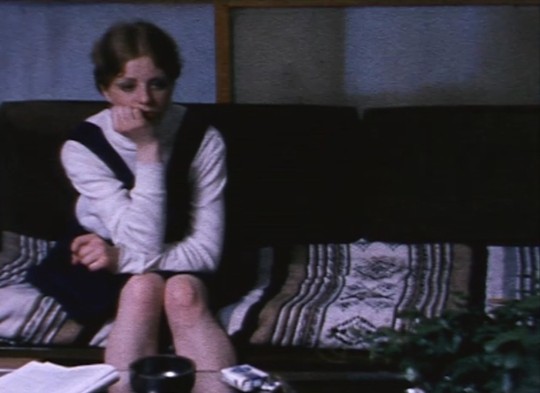

13 Fragments & 3 Narratives from Life (1968), dir. Jon Jost
184 notes
·
View notes
Text
The coolest gender thing in the 2009 Japanese video game persona 3 100% how hard they coded shinjiro as the dead mom
#.txt#i got soooo mad in the car driving home thinking about how his drug addiction is essentially the classic anime heart condition.#in that the only side effect of the suppressants is that they will kill him. like?#i realized for the longest time i had assumed the chest pain and sweating came from the drugs but thats. castor. obviously.#it doesnt affect his mood or his awareness its like a mood stabilizer pain relief pill?#its so odd that hes framed as like. being addicted to illegal street drugs. BY THE NARRATIVE.#when its more like hes on the most insane experimental medication that they wont even test on like. rats.#also im not fact checking any of this before posting. so i might be lying about things.#idk if it was all of strega that had trouble controlling their personas but like. chidori was because of the Experimentation.#and shinjis just like. mentally ill coded. in a bad way 😭#The inability to regulate a mood/stimuli to the point where he can be unsafe to himself or others.#broad ass symptom of disorders that are not treated well. its also interesting that its not brought on by a specific event.#like the childhood fire is there. but you have akihiko right there to directly compare it to. and hes arguably more effected by it all.#and he seems to be coping well 10+ years on like some coping mechanisms are kind of weird (protein) but nothing super out of the ordinary.#so the problem is really the october 4th incident which was just a pure honest to god accident.#the fact that it gets covered up as a car accident does feel like the best like. emotional equivalent.#because it being shinji being unable to control his persona his true representation of himself and it resulting in death is sooooo bleak#and it weighs on him for 2+ years of being suicidal and unhoused until finally he goes through with his suicide by martyrdom.#i lost the plot a little bit on the gender situation with the vague allusions to fraility when story convenient#acting as dorm den mother and cooking and sewing long hair jacket sillhouette reading like a dress#was referring to that before mental illness took over. woman under the influencing this anime boy.#long way of saying i think he should have a over the shoulder ponytail when hes older. and he should have a mood disorder.
19 notes
·
View notes
Note
i'm so curious: what's your favorite thing you've written? something that makes you nod and go, "yeah, that's it right there. i did that." just the best combination of words you've ever churned out in your personal opinion. it makes you proud just Thinking about it. could be a sentence, a paragraph, etc.
very cute ask anon, thank you. im going to assume for your benefit that you mean specifically my icemav writing—obviously I write outside of top gun and am very proud of that stuff but it wouldn’t make sense out of context.
There’s a lot of more recent stuff that I’m extremely extremely proud of on a technical level, but I’m prouder of this paragraph below on a deeper more existential level.
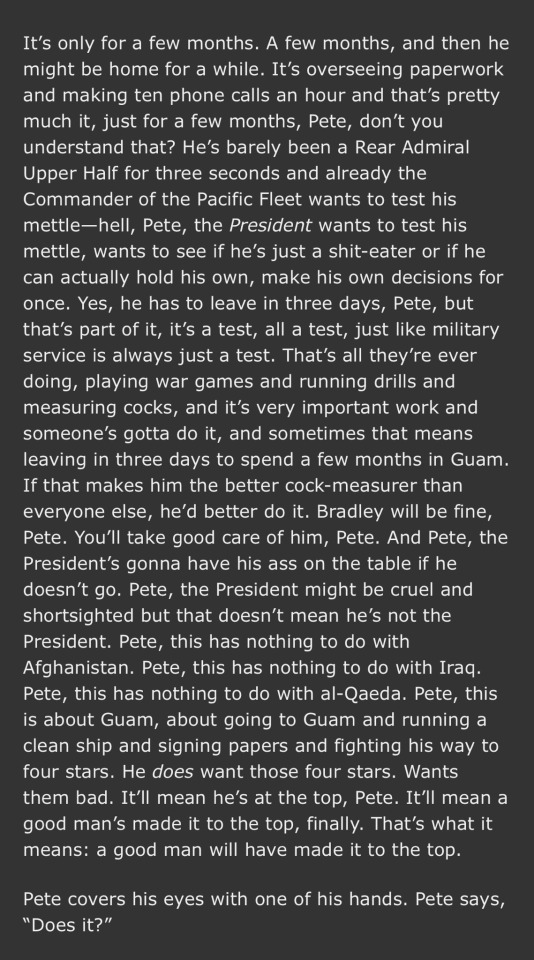
This paragraph was one of the first parts of WWGATTAI i ever wrote—august 12, i think, well before I had fully realized the characters’ voices or their attitudes towards life/each other; I only had about 5k written of what is now a 300k+ project (at the time of writing this paragraph i wanted it to be 10k max) and had no real outline, didn’t know who or what I was dealing with, hadnt seen TGM in two months, had done no research (so it’s not at all politically/militarily accurate or anything, why the FUCK is ice going to fucking GUAM)—and STILL this wound up being my favorite paragraph in the entire fucking series. not to suck my own dick or anything. I’m STILL so proud of this paragraph, 9 months and 275k+ words later, even though i Absolutely Would Not write it this way now.
#narrative distance both incredibly close and incredibly far#he’s trying to rationalize this whole situation and by extent the whole plot of his life#we’re inside his head as he tries to convince both Pete and himself of this huge huge lie#which is that leaving (right after he fucked their relationship and their best friend just died) is worth it for the navy’s sake#and it will make him a good man#in the masculine strong man leadership sense#and Pete (first name instead of last name; über vulnerable in the worst way because he’s crying yet doesn’t want to be seen crying)#counters all of this lie with—does it? does it really mean you’re a good man? it means you’re the weakest most subservient man i know#bending over backwards for the navy instead of your FAMILY#yeah i would absolutely not write this paragraph this way NOW but i am still so proud of what it represents in the story#& the very experimental 2nd person without quotation marks is i think done very well#at least for august 2022 me#some wording/phrasing/detail issues but other than that—a great paragraph!#again not to suck my own dick but you asked!#pete maverick mitchell#tom iceman kazansky#icemav#top gun#top gun maverick#top gun fanfiction#edts notes#asks#this is a terrible chapter in aggregate but it has some of the best diamond-in-the-rough moments in the whole series#ughhh the Pete this has nothing to do with Afghanistan; pete this has nothing to do with iraq etc line…. SOO good omg i love it sorry
54 notes
·
View notes
Text
to be clear, minerva/alistair playthrough is not dramatic breakup after sparing loghain. it’s a completely normal alistairmance playthrough and we all have to live with the knowledge that she would have spared loghain if she wasn’t in love with alistair. bc she’s insane.
#its not completely ‘the same plot but she’s in love with alistair’ i am altering some other things#for funsies. quest order. slightly different specs maybe#altered narrative weight is letting me betray jowan so whos excited for permanent emotional damage to me personally! sorry little man#minerva surana#so yeah this is a slightly different/experimental take on the same character#we’re mixing things up. it’ll be fun. i can’t seem to commit to any other character so
68 notes
·
View notes
Text
Garl prepares for his first Winter Solstice in Mirth, with the help of friends. He knows things are different outside of Mooncradle- but really, how different can it be?
I know, I know- Emily Dickinson for a title? Is it 2004? (I kid. Mostly. Titles and summaries are hard.)
I have come to the conclusion that Garl is impossible to write, and I have the utmost respect for people who do it! Whew.
Chewing on more worldbuilding, as I am wont to do; some part of me demands that the Great Eagle make sense, and this is apparently what comes of that.
#sea of stars#my fic#no pairings in this one; bring your own subtext as you like#well. no pairings in this chapter.#i'm not usually prone to writing this much narrative so this feels...almost experimental for me#i think i've also just gotten verbose in my old age and that's extremely funny to me
7 notes
·
View notes
Text
My super scraggly boyfriend fella made Weezer: The Movie in Death Valley to celebrate the Blue Album's 30th Anniversary!
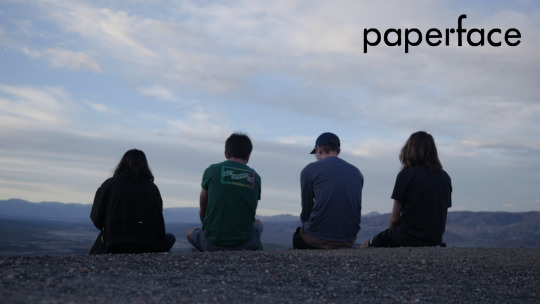
You can expect…

Crazed man wildly staring off in the distance and singing Weezer tunes!

A guy licking scrumptious salt flats! 😋

And even: emotions!
Watch now to WEEZE with laughter!
Synopsis:
In a 3-day trip to Death Valley (and one week of editing) we made a 41-minute indie drama/comedy celebrating Weezer's legendary Blue Album for its 30th anniversary.
Three college friends confront their future after picking up an eccentric, Weezer-obsessed, hitchhiker in the middle of Death Valley.
Every song from the album is here (singles Buddy Holly and Undone play only a minor role and are the only songs out of order from the full album release), the film is the exact length of the album, and the CD plays a role in the story as well.
https://youtu.be/M8a5whHzudg
#weezer#rivers cuomo#weeze#paperface#french new wave#diy#experimental#film#comedy#music#narrative#drama#art#travel#friendship#blue album#buddy holly#sentimental#improvisational#indie#independent#road movies#road trip
3 notes
·
View notes
Text
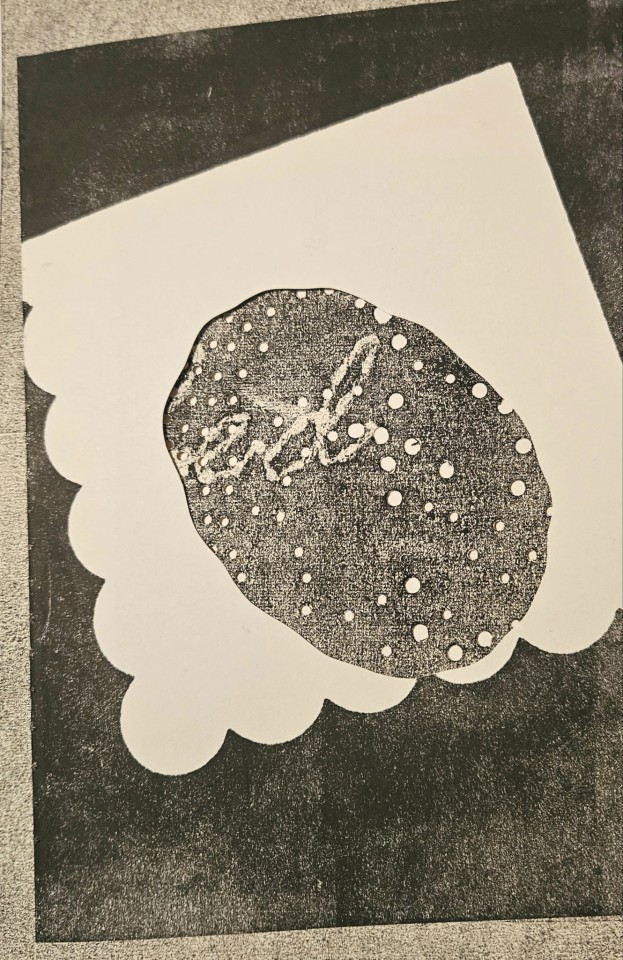
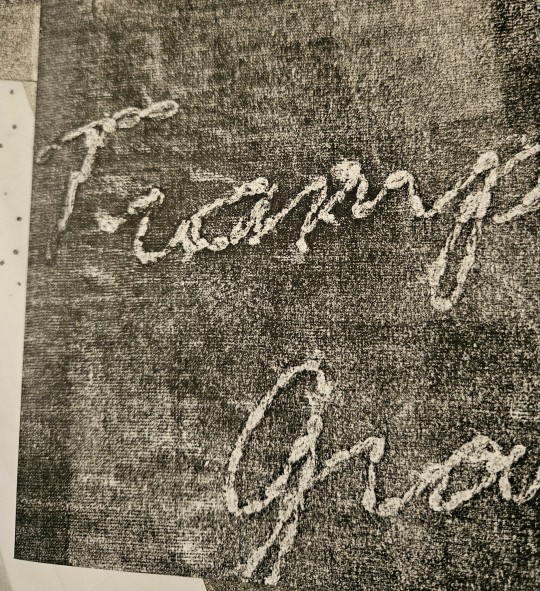
Exploring narrative and symbolism with monotype and stencils.
An evening of playful printing experiments which will set the tone for the next few weeks of preparation before returning to the studio.
Also exploring writings and essays on archiving as art practice with some inspiring writings from the Whitechapel Gallery
2 notes
·
View notes
Text

Roadkill Trophy, 2024.
#artists on tumblr#art#mixed media#sculpture#deer sculpture#hannibal aesthetic#violence narratives#experimental art#experimental sculpture#girlhood#violence and display
2 notes
·
View notes
Text
i can’t believe andrew hussie broke an 8 million yen vase and is now in debt to viz media
#but i have a great idea for how he can pay it off with an entirely different experimental satire on narrative form#ahem. orange text.
7 notes
·
View notes
Text

Private Imaginings And Narrative Facts (1966), dir. Edward Owens
#Private Imaginings And Narrative Facts#Edward Owens#60s#experimental film#short film#new american cinema#queer cinema
21 notes
·
View notes
Text
Having two different stylistic ideas for the same fic which are both interesting but also, unfortunately, mutually exclusive.
#thought of something that would be really fun to do and a bit different from my usual narrative voice#but would also not work at all with another thing i want to do in this fic#and i think the latter takes precedent sadly#maybe i can save the idea for something else#maybe i just need to go a touch more omniscient with my narrator#not another character but also a broader view#but also#while in theory this would be experimental for me#am i just trying to get away from the need to develop my oc's internal voice more clearly. it's probably that. :')#all right anne back to work lol#writing stuff
6 notes
·
View notes
Note
hi!! you recommended vonnegut a while ago, and i just read slaughterhouse five and it was incredible and i was wondering which one of his books is your favorite/which one you would recommend next?? thank you!!
oh my GOD yes yes yes I am not a normal person about kurt vonnegut. I have three options for you with pitches as to why.
Mother Night is one of my favorites out of everything he ever wrote, and it’s definitely an excellent second book. He wrote in his foreword that it’s the only book he ever wrote that he knew what the meaning of it was. Whether that’s actually true and remained true, I don’t know, but the point he makes in it is one that’s pretty profound and I’ve heard shockingly little of in media.
The book follows a former high-ranking member of the Nazi party, who was a very successful propagandist for them, which distracted from the fact that he was also the most successful wartime spy for Allied forces. It’s also one of the less weird books he’s ever written? Kurt Vonnegut really leans into absurdism, and it’s more evident in some books than others. This sort of helps with the learning curve.
That being said, Cat’s Cradle is my favorite out of all of his books, and it’s also the second I ever read, after slaughterhouse five. It’s like, 20% more weird than slaughterhouse five? So if you vibed with some of the weirder aspects of it (think like, the alien zoo subplot) then I highly recommend Cat’s Cradle. I honestly can’t figure out how to give a synopsis of this one without revealing information best revealed in the book, but it’s a commentary on the post-WWII arms race and religion. It’s insanely good.
The thing about Kurt Vonnegut is that he has a lot of different recurring themes, and I feel like everyone takes away some kind of core message from his works. That being said, I feel like The Sirens of Titan most clearly and compellingly states Vonnegut’s core message in his works, and it’s definitely a must-read out of his books. It’s not my favorite but it’s definitely fighting it out for a place at the very top of the list. It follows the richest man in the world, who has the least purpose in it, at the center of an interplanetary war between Mars and Earth.
I will say that there’s only one book that I would say you probably shouldn’t read as your second book and that’s Breakfast of Champions. There’s two reasons for this.
First, Kurt Vonnegut’s books exist in a loosely interconnected universe. He’s somewhere between Marvel and Shakespeare in how he does it. It’s not like Marvel where it’s feeding into an overarching narrative, and you don’t need to read them in some kind of particular order to understand, but he’s not like Shakespeare just alluding to his own works in different plays in the sense that these books are explicitly existing within the same universe. You have specific places (Ilium, which you saw in Slaughterhouse Five, shows up a lot) and characters that recur throughout. The protagonist of Mother Night, for example, is briefly referenced in Slaughterhouse Five, etc. They’re used primarily as a vehicle for meta commentary and it’s honestly so well executed.
Kilgore Trout makes the most appearances across the disparate novels. He’s widely regarded as a character meant to be a stand-in for Vonnegut himself, and he plays his largest role in Breakfast of Champions. You also have characters in Breakfast of Champions that are taken directly from his other books, like with the minor role the protagonist of Bluebeard plays in BoC (Bluebeard is also a banger of a book worth reading but personally my least favorite of all his books). Again, you don’t need to read Vonnegut’s books in any official order to understand them, but Breakfast of Champions has the most cameos and greatest use of meta fiction in it, so the reading experience is just overall enhanced by having a little more grounding in his other works.
The second reason is it’s really fucking weird.
In a brilliant kind of way. It’s regarded to be one of his best works, and it deserves the reputation. But the techniques he uses in this are by far the most experimental, and while those experiments absolutely pay off, I usually recommend that people get used to his particular approach to absurdism before tackling Breakfast of Champions. I highly recommend this book if you like Vonnegut, but really spend time with him as an author before reading it and you’ll get so much more out of it.
#fun fact mother night directly influenced Matt’s arc in acts of contrition and why he hasn’t returned to Jack yet#Vonnegut is also just probably the biggest influence on me as a writer overall#non-linear narratives broke my brain#I can’t go back to the normal passage of time#Bluebeard legit is a good book because everything he writes is good#probably 76% of my hate comes from his use of exclamation points in it#but out of all of his books I liked it the least#there’s a lot of books of his that are literary masterpieces but just aren’t SHOWSTOPPERS#like player piano Galapagos jailbird are all works of art but they just are up against some real heavyweights#also his short stories are really cool and creative if you get a chance to check them out#I’d do a doctoral study of vonnegut given HALF a chance#like I never did a formal study of literature for any university path#but i feel like if the multiverse theory is true in another life I did go with that career path#and funneled it right into a dissertation on vonnegut#the postmodernism movement in general is one of my favorite literary movements#and for me at least vonnegut is the best of that movement#I really like experimentalism in writing and vonnegut really pushed the bounds of the medium#also if you sent me an ask and I haven’t replied to it yet you’re not being ignored#some of the responses are on the longer end and it’s been busy#everyone is getting a reply tho
13 notes
·
View notes
Audio
new tunes out folks im quite proud of this one
2 notes
·
View notes